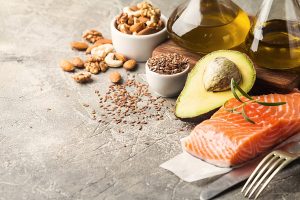
The first part of understanding how fat can influence health is distinguishing between body fat and dietary fat. High levels of body fat can cause inflammation and tax the immune system, making you more susceptible to illness.
Dietary fat is a completely different thing, and depending on what type you eat, you could be helping or working against immune strength.
Unhealthy fats like trans fats or high levels of saturated fats can cause inflammation and weaken your immune system. The most dangerous sources of these fats are those found in processed foods like microwave popcorn, lunch meats, potato chips, and other processed meat.
On the other hand, healthy fats like those found in olive oil, salmon, avocado, and a selection of nuts and seeds can have immune-strengthening effects. They might help your body’s immune response by lowering inflammation.
Olive oil is a rich source of monounsaturated fats, which are associated with a host of health benefits. It is highly anti-inflammatory and is linked with a decreased risk of inflammatory chronic health conditions like heart disease and type-2 diabetes.
These anti-inflammatory effects help to curb chronic inflammation that can have immunosuppressant effects.
These effects can help in the long and short term. People with existing inflammatory health conditions are at higher risk for cold, flu, and COVID-19. Their bodies are not prepared to fight off illness, and infection could lead to severe outcomes.
A stronger immune system might help you avoid illness in the first place and make your body more efficient at relieving illness. In the long-term, it can help your immune system stay stronger and more functional.
A number of factors play into immune strength. Diet is a major one. Focusing on boosting healthy fat intake and limiting unhealthy dietary fats may help lower your risk of illness. Fat intake just one part of a dietary approach to stronger immunity.